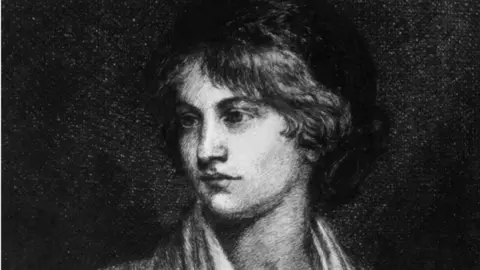Political heroes: Corbyn on Mary Wollstonecraft
The Unitarian chapel where Mary Wollstonecraft worshipped sits on Newington Green in north London, just on the edge of Jeremy Corbyn's Islington constituency.
In the 1780s, the church was home to a group of radical thinkers, including Wollstonecraft who, aged just 25, set up a school for girls close by. It didn't last very long, but the Labour leader says that idealism is just one of the reasons that he chose her as his political hero.
Born in London in 1759, Wollstonecraft is considered by many to be the mother of modern feminism. She was a radical thinker, novelist and writer whose affairs and ideas scandalised polite society.
Mr Corbyn said: "She was a kind of historically suppressed figure. She had an approach which, these days, you'd describe as sexual freedom, or 'free love' and the social mores of that era couldn't cope with that for women."
Changing attitudes
Written when she was 33, her most famous work A Vindication of the Rights of Women imagined a social order where women were the equals of their husbands.
While some might be surprised that Mr Corbyn did not point to a more obvious socialist thinker, he said Wollstonecraft's example was something to aspire to.
 Getty Images
Getty Images"The process she went through in her life shows that if you think hard enough, you can actually change a lot of things.
"She didn't know it, but she was fundamental to changing attitudes on the relationship between men and women. She didn't want women to be superior to men, she wanted women to have control of their own lives."
Mr Corbyn said he had first come across Mary Wollstonecraft while working with Labour colleagues in the 1970s, adding: "I'm sure my mother spoke about her as well, my mother spoke about a lot of things - and you should always listen to your mother."
Inspired by the ideals of the French Revolution, Wollstonecraft travelled to Paris in 1792. When the hard-line Jacobins seized control the following year, she saw friends executed and was herself in danger. But her continued belief in the ideals of the revolution is something Mr Corbyn very much admires.
"She was fascinated by the ideas of liberation that the revolution offered to obviously the vast majority of very, very poor people in France, but also she saw it as an opportunity for women to be liberated from their family enslavement as well as their social enslavement."
While in Paris, Wollstonecraft gave birth to a daughter by her lover, the American adventurer Gilbert Imlay. When he left them, she returned to England where she attempted suicide.
But she survived and back in London she met and fell in love with the philosopher William Godwin.
The couple had an unconventional marriage, living next door to each other in neighbouring houses and corresponding by letter every day. Mr Corbyn said this may have been the 18th Century version of the "man cave" although he cannot quite understand why they "didn't just talk over the fence".
Tragically Wollstonecraft died just days after giving birth to her second daughter, Mary Godwin in 1793. That little girl, who grew up surrounded by her parents' radical friends, would go on to marry the poet Percy Shelley. Mary Shelley would later write the gothic classic, Frankenstein.
Mary Wollstonecraft's reputation was tarnished by contemporary attitudes to her life and it would be many generations before her work would find a new audience.
"She didn't set out to make herself famous or be a leader," Mr Corbyn said.
"She stood for what she believed in, she said that girls were as good as boys, that women were as good as men and they should be supported and educated so that they can fulfil their full potential".
